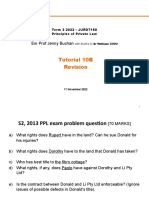0 ratings0% found this document useful (0 votes)
63 viewsIntroduction To Business Law: Type Author Names Here Lucy Jones
Introduction To Business Law: Type Author Names Here Lucy Jones
Uploaded by
William MushongaThis document provides an overview of key concepts in business law related to contractual agreements, including: intention to create legal relations; contractual capacity; consideration; and privity of contract. It examines relevant cases that helped establish principles for what makes an agreement legally binding and how third parties' rights and past consideration affect enforceability. The document aims to introduce foundational elements of how the law approaches formation and obligations within business contracts.
Copyright:
© All Rights Reserved
Available Formats
Download as PPT, PDF, TXT or read online from Scribd
Introduction To Business Law: Type Author Names Here Lucy Jones
Introduction To Business Law: Type Author Names Here Lucy Jones
Uploaded by
William Mushonga0 ratings0% found this document useful (0 votes)
63 views14 pagesThis document provides an overview of key concepts in business law related to contractual agreements, including: intention to create legal relations; contractual capacity; consideration; and privity of contract. It examines relevant cases that helped establish principles for what makes an agreement legally binding and how third parties' rights and past consideration affect enforceability. The document aims to introduce foundational elements of how the law approaches formation and obligations within business contracts.
Original Title
jonesibl3e_ch05.ppt
Copyright
© © All Rights Reserved
Available Formats
PPT, PDF, TXT or read online from Scribd
Share this document
Did you find this document useful?
Is this content inappropriate?
This document provides an overview of key concepts in business law related to contractual agreements, including: intention to create legal relations; contractual capacity; consideration; and privity of contract. It examines relevant cases that helped establish principles for what makes an agreement legally binding and how third parties' rights and past consideration affect enforceability. The document aims to introduce foundational elements of how the law approaches formation and obligations within business contracts.
Copyright:
© All Rights Reserved
Available Formats
Download as PPT, PDF, TXT or read online from Scribd
Download as ppt, pdf, or txt
0 ratings0% found this document useful (0 votes)
63 views14 pagesIntroduction To Business Law: Type Author Names Here Lucy Jones
Introduction To Business Law: Type Author Names Here Lucy Jones
Uploaded by
William MushongaThis document provides an overview of key concepts in business law related to contractual agreements, including: intention to create legal relations; contractual capacity; consideration; and privity of contract. It examines relevant cases that helped establish principles for what makes an agreement legally binding and how third parties' rights and past consideration affect enforceability. The document aims to introduce foundational elements of how the law approaches formation and obligations within business contracts.
Copyright:
© All Rights Reserved
Available Formats
Download as PPT, PDF, TXT or read online from Scribd
Download as ppt, pdf, or txt
You are on page 1of 14
Lucy
Type Jones
author names here
Introduction to Business Law
Chapter 5
© Oxford University Press, 2015. All rights reserved.
Jones: Introduction to Business Law
Intention to Create Legal Relations
Jones: Introduction to Business Law
Simpkins v Pays (1955)
• Mrs Pays, her granddaughter and lodger
enter into a competition each week.
• They agree to share any prizes.
• Entries are sent in Mrs P’s name.
• One week they win £750. But Mrs P refuses
to share money with lodger.
Decision: From facts there was an intention to
enter into legal relations - lodger entitled to
1/3rd of winnings.
Jones: Introduction to Business Law
Commercial/Business Agreements
Presumed parties intend agreement to be
legally binding unless:
• Agreement states it is not binding or
• Party seeking to have agreement set aside
can show that at the time the agreement was
made there was no intention that it should be
legally enforceable.
If the commercial/business agreement is ambiguous
an intention to create legal relations will be
presumed. Edwards v Skyways (1964).
Jones: Introduction to Business Law
Contractual Capacity
• Capacity to enter into contracts may be
limited where one of the parties is:
• A minor
• Intoxicated
• Mentally impaired
• A corporation acting outside its powers.
Jones: Introduction to Business Law
Contractual Capacity: Minors
Jones: Introduction to Business Law
Consideration
• In order for a contract to be legally
enforceable there must be an exchange of
consideration (the law does not enforce
gratuitous promises unless made under
deed).
• The consideration provided by each party
must have some value but need not be of
adequate value i.e. the law is not concerned if
one party makes a poor bargain.
Jones: Introduction to Business Law
Value of Consideration
Even items which Chappell v Nestle (1966)
are disposed of by Chocolate wrappers
one parties as sent to Nestle could
having no value amount to part of the
may represent consideration for a
valuable legal record, as Nestle
consideration. benefitted the sales of
chocolate which may
not otherwise have
been sold.
Jones: Introduction to Business Law
Past consideration
Re McArdle (1951)
• Consideration • Mr. M died and left his house
given before a to Mrs M and then to their
contract is children in equal shares.
completed (past • Daughter-in-law, (D) made
consideration) is house improvements costing
not adequate for £488.
a binding • After improvements made all
contract. children signed agreement
that they would reimbursed D
when Mrs M died.
• Decision: Agreement was
after work done and was not
legally enforceable D could
not claim reimbursement.
Jones: Introduction to Business Law
Consideration must be sufficient
• Performance of a public duty:
• A party to a contract cannot use what they are
required to do as a public duty as
consideration in a contract, Collins v
Godefroy (1831).
• But if they do more than their public duty that
can amount to good consideration, Glasbrook
Bros v Glamorgan CC (1925).
Jones: Introduction to Business Law
Contractual Duties in existing contracts:
Williams v Roffey Bros (1990)
Jones: Introduction to Business Law
Privity of Contract
Jones: Introduction to Business Law
Contracts (Rights Of Third Parties)
Act 1999
• Persons who are not party to a contract can
sue for their rights under the contract:
where the contract expressly permits enforcement
by third parties or
where the purpose of the contract is to benefit the
third party (unless clear that the contract did not
intend to create rights for third parties).
• A person need not be in existence at time
contract was made to gain rights under it.
Jones: Introduction to Business Law
You might also like
- Don Colacho's Aphorisms English)Document388 pagesDon Colacho's Aphorisms English)quokwok325092% (12)
- RAMONCITA O. SENADOR v. PEOPLEDocument2 pagesRAMONCITA O. SENADOR v. PEOPLEAneesh AlliceNo ratings yet
- Financial Management 2 Test 4Document3 pagesFinancial Management 2 Test 4William MushongaNo ratings yet
- Synthesis Essay 1Document2 pagesSynthesis Essay 1api-464366335No ratings yet
- 5 Commercial Law - ConsiderationDocument20 pages5 Commercial Law - ConsiderationŒtk ŒmærïNo ratings yet
- Commercial Law: Bachelor of CommerceDocument24 pagesCommercial Law: Bachelor of CommerceVinay DawarNo ratings yet
- L 4 ConsiderationDocument27 pagesL 4 Considerationn8bwzswcnnNo ratings yet
- Lec 11 - ConsiderationDocument28 pagesLec 11 - ConsiderationRina TaluNo ratings yet
- Contract Law - Consideration SCDocument29 pagesContract Law - Consideration SCreena0610 gNo ratings yet
- Consideration and IntentionDocument20 pagesConsideration and IntentionRanya100% (1)
- Group 1 Law PresentationsDocument7 pagesGroup 1 Law Presentationskenwellmahowe143No ratings yet
- L113-FPD-3-2024-2Document14 pagesL113-FPD-3-2024-2nancynachula02No ratings yet
- Lecture 3Document8 pagesLecture 3Syeda Numaira Shehrin 2022400630No ratings yet
- Contract Formation ConsiderationDocument16 pagesContract Formation ConsiderationJean DuboisNo ratings yet
- 1CONTRACTDocument89 pages1CONTRACTjuhi100% (1)
- Law of Contract - Intention To Create Legal Relations (1) 2Document14 pagesLaw of Contract - Intention To Create Legal Relations (1) 2RoyceNo ratings yet
- Law of Contract - IntentionDocument15 pagesLaw of Contract - IntentionCat can eat SquirrelNo ratings yet
- Lecture 1 - Law of Contract-1Document32 pagesLecture 1 - Law of Contract-1skalema34No ratings yet
- Week 1 - Agreement (Offer)Document58 pagesWeek 1 - Agreement (Offer)Aronyo DeyNo ratings yet
- Topic 5Document15 pagesTopic 5Shafeela ThasNo ratings yet
- Chapter 3.3 - Other ElementsDocument32 pagesChapter 3.3 - Other ElementshelloganNo ratings yet
- Chapter 2 - Intention To Create Legal RelationDocument3 pagesChapter 2 - Intention To Create Legal RelationSair100% (1)
- ConsiderationDocument29 pagesConsiderationkrish vikramNo ratings yet
- Lec 8 - ConsiderationDocument28 pagesLec 8 - ConsiderationMigori ArtNo ratings yet
- Law PaperDocument194 pagesLaw PaperTessaNo ratings yet
- Consideration Exam NotesDocument6 pagesConsideration Exam NotesZohaib090No ratings yet
- Week 6 - Contracts Law - Continued - Capacity-Genuine Consent-LegalityDocument52 pagesWeek 6 - Contracts Law - Continued - Capacity-Genuine Consent-LegalityUshra KhanNo ratings yet
- Agreement & ICLRDocument15 pagesAgreement & ICLRHamza AslamNo ratings yet
- Equity and The Law of Trusts 4Document29 pagesEquity and The Law of Trusts 4onokaanne9No ratings yet
- Week 1 SlidesDocument49 pagesWeek 1 Slideskhanyisilengwenya59No ratings yet
- Introduction To Contract Act 1872Document52 pagesIntroduction To Contract Act 1872Aakash ChhabraNo ratings yet
- Contract ActDocument32 pagesContract ActMonika KauraNo ratings yet
- bl资料Document4 pagesbl资料yuhanc475No ratings yet
- ConsiderationDocument20 pagesConsiderationjasmineblogs8No ratings yet
- GoodThe Contracts OutlineDocument30 pagesGoodThe Contracts OutlineChris BurgeNo ratings yet
- Session 6 - Other - ElementsDocument32 pagesSession 6 - Other - ElementsChan HF PktianNo ratings yet
- Contract Law - Consideration SC3Document26 pagesContract Law - Consideration SC3Ganesh KumarNo ratings yet
- ConsiderationDocument15 pagesConsiderationRanyaNo ratings yet
- DIL 1103 Contract - Lecture 1Document560 pagesDIL 1103 Contract - Lecture 1ZurulNo ratings yet
- ConsiderationDocument4 pagesConsiderationZeeshan HaiderNo ratings yet
- Abraham Favour Izeh 418 21cb029733(3)Document7 pagesAbraham Favour Izeh 418 21cb029733(3)Gbenga FavourNo ratings yet
- No 15 ConsiderationDocument13 pagesNo 15 ConsiderationRANDAN SADIQNo ratings yet
- Lecture 1 - Law of Contract-1Document33 pagesLecture 1 - Law of Contract-1akankundalindahNo ratings yet
- Contract Law - Offer Acceptance SCDocument42 pagesContract Law - Offer Acceptance SChannushaNo ratings yet
- Law of ContractDocument24 pagesLaw of Contractaman212506No ratings yet
- Lectures 6 & 7Document15 pagesLectures 6 & 7Syeda Numaira Shehrin 2022400630No ratings yet
- Week 4 - Elements of a Valid Contract (Contd.)Document12 pagesWeek 4 - Elements of a Valid Contract (Contd.)jhudamhNo ratings yet
- 5 - PPP - Contract Law I - 2022Document65 pages5 - PPP - Contract Law I - 2022Nguyen NhunggNo ratings yet
- BSP 190 - Unit 2 Part 2Document56 pagesBSP 190 - Unit 2 Part 2YvonneNo ratings yet
- ConsiderationDocument32 pagesConsiderationNURAINA BARIZAH MOHD ZUKINo ratings yet
- Lecture 2Document9 pagesLecture 2J. Angel AiozNo ratings yet
- Contract: Consideration & IntentionsDocument33 pagesContract: Consideration & IntentionsVân Anh LêNo ratings yet
- 2 Intention Create LGL Relation R3.3Document22 pages2 Intention Create LGL Relation R3.3HSIN YI LIMNo ratings yet
- Chapter 2 - ConsiderationDocument14 pagesChapter 2 - ConsiderationsupremeshaktivelNo ratings yet
- 2.1 ContractDocument48 pages2.1 ContractSaroj TimalsinaNo ratings yet
- 10B Revision - SummaryDocument10 pages10B Revision - SummaryGloriaNo ratings yet
- ContractDocument14 pagesContractTimodh PatawaNo ratings yet
- Contract LawDocument28 pagesContract LawAhmed Fathy100% (1)
- Bul 507 formatn of contract (consideration)Document8 pagesBul 507 formatn of contract (consideration)olowusamuel777No ratings yet
- Incapacity & PrivityDocument11 pagesIncapacity & PrivityLionel MessiNo ratings yet
- 4 Commercial Law - Intention To Create Legal RelationsDocument13 pages4 Commercial Law - Intention To Create Legal RelationsŒtk ŒmærïNo ratings yet
- Certainty, Capacity and PrivityDocument18 pagesCertainty, Capacity and PrivityKizeia BelfonNo ratings yet
- Financial Reporting Task 5 MemoDocument3 pagesFinancial Reporting Task 5 MemoWilliam MushongaNo ratings yet
- Assignment 1 Computer Studies Level 3Document3 pagesAssignment 1 Computer Studies Level 3William MushongaNo ratings yet
- Introduction To Business Management Lesson 3Document3 pagesIntroduction To Business Management Lesson 3William MushongaNo ratings yet
- Financial Reporting Task 4 MemoDocument5 pagesFinancial Reporting Task 4 MemoWilliam MushongaNo ratings yet
- Financial Reporting Class Test 1 MemoDocument5 pagesFinancial Reporting Class Test 1 MemoWilliam MushongaNo ratings yet
- International Training College - Lingua: Department of Business and Management Marking Key: Assignment 3Document4 pagesInternational Training College - Lingua: Department of Business and Management Marking Key: Assignment 3William MushongaNo ratings yet
- Introduction To Business Management Assignment 02Document2 pagesIntroduction To Business Management Assignment 02William MushongaNo ratings yet
- Introduction To Business Management Lesson 4Document3 pagesIntroduction To Business Management Lesson 4William MushongaNo ratings yet
- Introduction To Business Management Lesson 1Document4 pagesIntroduction To Business Management Lesson 1William MushongaNo ratings yet
- Intro Bus Group ActivityDocument4 pagesIntro Bus Group ActivityWilliam MushongaNo ratings yet
- Financial Management 2 Test 2Document3 pagesFinancial Management 2 Test 2William MushongaNo ratings yet
- Financial Management 2 Assignment 02Document2 pagesFinancial Management 2 Assignment 02William MushongaNo ratings yet
- Financial Management 2 Test 2Document3 pagesFinancial Management 2 Test 2William MushongaNo ratings yet
- Financial Management 2 Class Handout 1Document4 pagesFinancial Management 2 Class Handout 1William MushongaNo ratings yet
- Financial Management 1 Assignment 03Document4 pagesFinancial Management 1 Assignment 03William MushongaNo ratings yet
- Financial Management 1 Assignment 02Document3 pagesFinancial Management 1 Assignment 02William MushongaNo ratings yet
- Financial Management 2 Assignment 02Document2 pagesFinancial Management 2 Assignment 02William MushongaNo ratings yet
- Commercial Law Assignment 05Document2 pagesCommercial Law Assignment 05William MushongaNo ratings yet
- Company Law Assignment 05Document4 pagesCompany Law Assignment 05William MushongaNo ratings yet
- Financial Management 1 Assignment 01Document4 pagesFinancial Management 1 Assignment 01William MushongaNo ratings yet
- Company Law Assignment 04Document3 pagesCompany Law Assignment 04William MushongaNo ratings yet
- Company Law Assignment 01Document2 pagesCompany Law Assignment 01William MushongaNo ratings yet
- Commercial Law Assignment 02Document2 pagesCommercial Law Assignment 02William MushongaNo ratings yet
- Commercial Law Assignment 04Document2 pagesCommercial Law Assignment 04William MushongaNo ratings yet
- Introduction To Business Management Assignment MemoDocument6 pagesIntroduction To Business Management Assignment MemoWilliam MushongaNo ratings yet
- Creating An Entrepreneurial Environment LessonDocument3 pagesCreating An Entrepreneurial Environment LessonWilliam MushongaNo ratings yet
- Commercial Law Assignment 01Document2 pagesCommercial Law Assignment 01William Mushonga100% (1)
- PESTEL Lesson PlanDocument1 pagePESTEL Lesson PlanWilliam MushongaNo ratings yet
- Establishment of A BusinessDocument11 pagesEstablishment of A BusinessWilliam MushongaNo ratings yet
- Benefits From The Biographies of The Scholars Abdullah QarawiDocument2 pagesBenefits From The Biographies of The Scholars Abdullah Qarawihttp://AbdurRahman.orgNo ratings yet
- A Filbert Is A Nut by Raphael, Rick, 1919-1994Document14 pagesA Filbert Is A Nut by Raphael, Rick, 1919-1994Gutenberg.orgNo ratings yet
- Cyber Law - Sem VII 2023Document4 pagesCyber Law - Sem VII 2023riyaNo ratings yet
- SWG Joint Life BrochureDocument19 pagesSWG Joint Life BrochureHardik BajajNo ratings yet
- Lim Vs PeopleDocument10 pagesLim Vs PeopleAMNo ratings yet
- 01 Boothe V Director of PatentsDocument3 pages01 Boothe V Director of PatentsPio Guieb AguilarNo ratings yet
- Ss Pat Practice Grade 6Document28 pagesSs Pat Practice Grade 6api-288765905No ratings yet
- Amendment To Anti-Money Laundering Act of 2001, Republic Act No. 9194, (2003)Document8 pagesAmendment To Anti-Money Laundering Act of 2001, Republic Act No. 9194, (2003)Mak FranciscoNo ratings yet
- Matrimonial Cause 10 of 2016 Formerly Civil Suit 348 of 2012Document7 pagesMatrimonial Cause 10 of 2016 Formerly Civil Suit 348 of 2012muikianellyNo ratings yet
- Who May Be Adopted?: Basic Guidelines On How A Foreigner Can Adopt A Filipino ChildDocument4 pagesWho May Be Adopted?: Basic Guidelines On How A Foreigner Can Adopt A Filipino Childjaine0305No ratings yet
- FraudDocument1 pageFraudLiza Y. EspinosaNo ratings yet
- MINUTESDocument1 pageMINUTESElla Jade CadizNo ratings yet
- Justice Athar Minallah JudgementDocument4 pagesJustice Athar Minallah JudgementDawndotcomNo ratings yet
- YaVaughnie Wilkins BankruptcyDocument8 pagesYaVaughnie Wilkins BankruptcyCalifornia Public Access100% (1)
- NewsRecord14 05 28Document20 pagesNewsRecord14 05 28Kristina HicksNo ratings yet
- Stack1 Runbook R21Document84 pagesStack1 Runbook R21Gopinath KannasamudramNo ratings yet
- Equity and Trust Group Course WorkDocument15 pagesEquity and Trust Group Course WorkdowdenconsultgroupltdNo ratings yet
- Chapter - 1: Circumstantial Evidence Is Evidence That Relies On An Inference To Connect It To ADocument17 pagesChapter - 1: Circumstantial Evidence Is Evidence That Relies On An Inference To Connect It To ARupali RamtekeNo ratings yet
- Chapter 9 InvestmentsDocument19 pagesChapter 9 Investmentsjuennagueco100% (2)
- Exam Practice QuestionsDocument2 pagesExam Practice Questionskiema katsutoNo ratings yet
- Asia-Pacific Trade and Investment Report 2019: Navigating Non-Tariff Measures Towards Sustainable DevelopmentDocument4 pagesAsia-Pacific Trade and Investment Report 2019: Navigating Non-Tariff Measures Towards Sustainable DevelopmentRegis AlonaNo ratings yet
- 018 Psychic MathDocument1 page018 Psychic MathFaeGiNNo ratings yet
- Audit ProceduresDocument2 pagesAudit ProceduresIohc NedmiNo ratings yet
- Ethical Issues in FinanceDocument34 pagesEthical Issues in FinanceKrupa MehtaNo ratings yet
- Feb 2nd Week MCQ (Eng) by ACDocument70 pagesFeb 2nd Week MCQ (Eng) by ACDk16 252LubanaNo ratings yet
- Cheap Flights, Flight Booking & Airline Tickets OnlineDocument3 pagesCheap Flights, Flight Booking & Airline Tickets OnlineUmar YusufNo ratings yet
- 50 Survey Questionnaire PR2Document5 pages50 Survey Questionnaire PR2Princess GabaynoNo ratings yet





















































































































